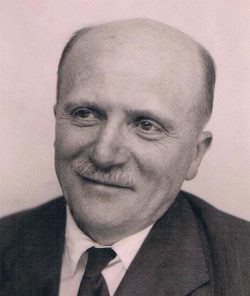Paul Conord (1896-1985)
Pastor Paul Conord held many positions of reponsibility in the Eglise Réformée de France and later in the Fédération Protestante de France. His special contribution was the study of sociology in French Protestantism.
His youth
Paul Conord was born in Sainte-Foy-la-Grande, on the border between the Gironde and Dordogne – his family had traditionally been clockmakers and belonged to the Protestant faith. His father died shortly after his birth so he was brought up by his mother and his grandparents.
He was studying philosophy and theology in Montauban when the First World War broke out. He served as a soldier and then continued his studies after 1918 in Montpellier, where the theology faculty was now installed. At university he joined the YMCA, which was part of the French Federation of Christian Student Associations. He later took on a position of responsibility within this movement. This is why he later participated in the Ecumenical Conference in Lausanne: ‘Faith and Constitution’, as well as the ecumenical conference in Oxford in 1937.
Paul Conord became a pastor
Conord’s ministry began in 1920 in Mauberge, in the North of France – it was a working-class area which had suffered from heavy fighting during the First World War. He assisted Pastor Henri Nick, who consecrated him as pastor in 1921 who sensibilisée him to the difficulties of evangelization in a working-class area. He established a family in 1921 when he married Jeanne Bohen and they had 7 children together. In 1926 he became pastor in Réalville in Tarn et Garonne. Here he began to write a thesis for the Baccalaureat in Theology, which he later continued in Albi and which he presented in 1936. This was in addition to his pastoral ministry and work with the Student Federation. This work became the basic structure of the theses of the community of Pomeyrol in 1941, which he supervised personally.
He had positions of responsibility in ecclesial institutions
In 1943, he was appointed General Secretary of the Eglise Réformée de France. From now on, he had positions of responsibility at a national level in French Protestantism, first of all in the Eglise Réformée de France and later in the Fédération Protestante de France.
It was because he held these responsibilities that he was able to be present at the beginnings of the Ecumenical Council at the conference in Amsterdam in 1948; he participated in several European bodies authorities: the Christian Conference for Peace, the Franco-German Council for Friendship etc.
He retired in 1963 but remained active in several spheres; in particular he taught theology at the Theology Institute of Ndunge in Cameroons.
Paul Conord was a sociologist
From the beginning of his ministry Paul Conord was confronted with many different Protestant backgrounds and he had always wanted to study this more closely. It is the main theme of his thesis ‘The problem of Christian Sociology’.
He undertook demographical and sociological enquiries at a high level in the Eglise Réformée de France with the aim of guiding and improving ecclesial strategy.
He supported the Sociology Centre of Protestantism at the University of Strasbourg, which was directed for a long time by Pastor Roger Mehl and he contributed personally to its success.
Bibliography
- Books
- CONORD Paul, Le problème d’une sociologie chrétienne, Je sers, Paris, 1936
- CONORD Paul, Brève histoire de l’œcuménisme, Labor et Fidès, Paris, 1958
Associated notes
-

The Pomeyrol Theses
The Pomeyrol Theses were among the first acts of spiritual resistance to Nazism and opposition to the persecution of the Jews.

